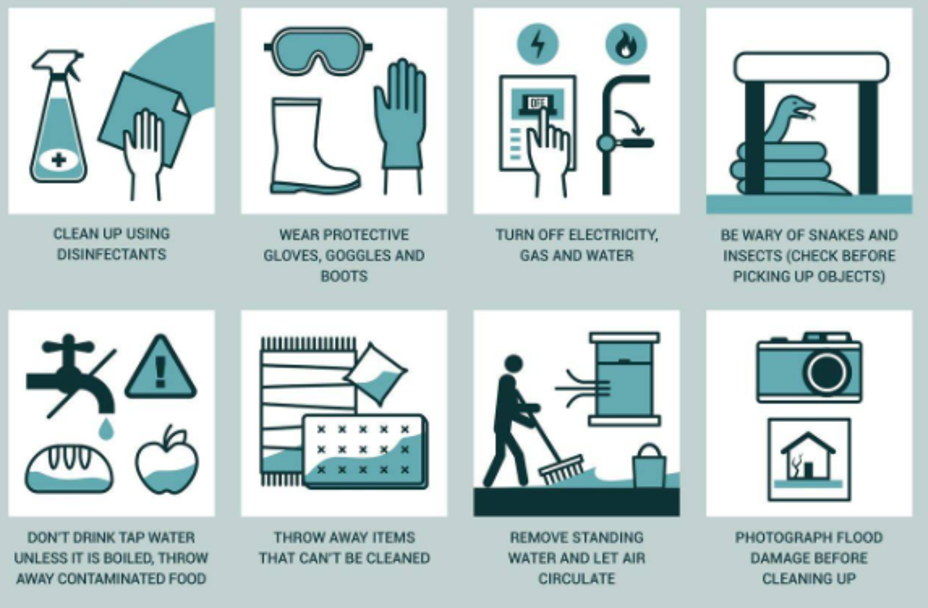Floods are a devastating and extremely dangerous situation. Planning is key, as is acting early to keep yourself and staff safe, and to secure the venue as much as possible.
What are the risks involved?
- Driving on damaged or flooded roads
- Unsafe atmospheres and damaged structures inside the venue
- Biological hazards
- Chemical spills
- Debris, fallen items, broken glass
- Electrical hazards
Immediate actions required if a flood is predicted / likely
To reduce the risk WELL before the flood happens:
- Keep informed with the weather conditions
- Ensure you have emergency contact details including SES, security company and utility company numbers
- Act quickly if the flood predictions are becoming likely
- Move as much stock and chemicals to higher ground as possible using mechanical aids (e.g. trolleys, wheelbarrows etc.) wherever possible
- Secure lifts, gas bottles and other large items
- Use PPE (gloves, mask, goggles, boots) to prevent exposure to hazardous chemicals and sharp edges / broken glass etc.
- Turn off the power at the mains as you leave
- Secure the venue and ensure you and all staff are accounted for and are in a safe location
- Sandbag if possible and if likely to be beneficial and is safe to do so, otherwise evacuation is preferred
Immediate actions required when flood is approaching:
- Always listen to evacuation warnings and orders. Act early and get yourself and other people to safety before the emergency escalates. The venue is replaceable – you are not!!
- Evacuate yourself and other people from the area and get to safe ground. Your safety is the number one priority. Ensure your staff are accounted for and in a safe place.
After a flood event
- Keep informed via reputable news sources
- Only drive if the roads are open and are safe to do so. Drive only in daylight if possible. Debris, flooded and damaged roads are all very likely.
- Ensure someone knows you are entering the venue and can contact you. Preferably take at least another person with you.
- Only enter the venue if the area has been declared safe by emergency services
- Check the structure visually yourself. If there is any visible and dangerous structural damage, do not enter.
- Take a torch as it’s likely the power will still be off. Don’t switch the power back on until it’s been declared safe by an electrician or the electricity provider.
- Wear full PPE when entering the venue in case of chemical and biological exposure
- If people are assisting you to clean up, ensure you provide them with the potential hazard information including slips, falls and manual handling and the potential for chemical hazards. Provide them with safety information and the required PPE to keep them safe. These people are classed as volunteers and as such, are workers under the WHS Act!!
- Ensure the people helping with the clean up have access to safe drinking water (bottled), take regular breaks and don’t work too many hours or go beyond their individual limits.
- Ensure there are decontamination measures available including removing any potentially contaminated clothing, footwear and PPE. Wash down skin thoroughly and launder clothing separately to other clothes. Flood waters can contain nasty biological contaminants.
- Flood waters may contain biological contaminants such as bacteria, sewerage and other chemicals. Ensure your personal hygiene is of a very high standard and wash face and hands prior to eating, drinking, smoking or providing first aid. Cover wounds or cuts with waterproof bandages. Avoid getting flood water in your mouth, nose or eyes as much as possible.
- Biological hazards may also include snakes, spiders and other wildlife. Always be aware that they may be in the area after being carried out in flood waters.
- If you feel sick after dealing with flood waters, consult your doctor
- If you feel stressed or traumatised after the flooding event, please seek help from your doctor, a counsellor or if available, an employee assistance program

For any specific advice about planning for emergency, dealing with floods or staff emergency training, please contact Michelle Pitman, DWS Work Health Safety & Compliance Advisor, on 0401 014 619 or michelle@dws.net.au.



